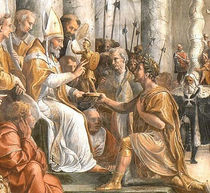The Catholic Defender: St. Joan of Arc
- Donald Hartley

- May 29, 2025
- 2 min read
Updated: Jun 1, 2025
Deepertruth with special permission and aid with Franiciscan Media, a great team for the Lord

The feast day of Saint Joan of Arc is traditionally celebrated on May 30th as it was the day that she was burned at the stake in Rouen, France; but of course, you can pray through her strong intercession any time!
When she was being burned at the stake, she asked someone to make a small crucifix which she put in the top of her dress, while a priest held one up for her to look at as she died. Witnesses said she met her fate with composure and bravery.
Since the creation of her feast day, Saint Joan of Arc has been one of the most popular saints in the history of the Catholic Church. It actually took more than 400 years after her death until she was canonized by Pope Benedict XV in 1920.
Saint Joan, also known as the Maid of Heaven, is often invoked for strength and courage, which she herself exemplified throughout her life as she followed God’s direction and led the French army to several victories during the Hundred Years War.
Saint Joan of Arc was born on January 6, 1412 to very pious parents in Domremy, France. At a very early age, she heard the voice of God in her father’s garden, followed later by hearing the voices of Saint Michael, St. Catherine and St. Margaret. These voices told her to go to the King of France to help him reconquer France’s liberty.
After much opposition, Saint Joan was finally given a small army that raised a siege at Orleans. This was the first of many battles that the French army won by her leadership and guidance. Furthermore, those victories led to the coronation of Charles VII, which was a central part of her mission.

After King Charles VII’s coronation, however, Saint Joan was captured and sold to the British, who only saw her as a heretic. The British put her on trial, and after refusing to retract her statements that the voices she heard were from the saints of God, the British then convicted and sentenced her to burn at the stake. She was condemned to death as a heretic, sorceress and adulteress. She was nineteen years old.
On this day in 1431, Joan was burned at the stake in Rouen, and her ashes were scattered in the Seine River. A second Church trial 25 years later nullified the earlier verdict, which was reached under political pressure.
Remembered by most people for her military exploits, Joan had a great love for the sacraments, which strengthened her compassion toward the poor.
During the Hundred Years War, Joan led French troops against the English and recaptured the cities of Orléans and Troyes. This enabled Charles VII to be crowned as king in Reims in 1429. Captured near Compiegne the following year, Joan was sold to the English and placed on trial for heresy and witchcraft. Professors at the University of Paris supported Bishop Pierre Cauchon of Beauvis, the judge at her trial; Cardinal Henry Beaufort of Winchester, England, participated in the questioning of Joan in prison. In the end, she was condemned for wearing men’s clothes.
“I fear nothing for God is with me,” she said.





















Comments